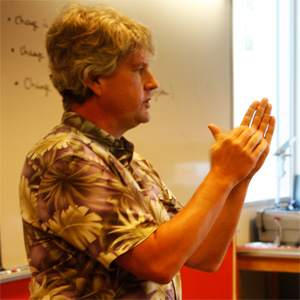 Science is becoming increasingly interdisciplinary. The developing fields of nanotechnology, genetic engineering, and therapeutic drug design, for example, certainly require us to stretch our thoughts across traditional disciplinary boundaries. Resolving problems associated with global warming, emergent epidemic diseases, and our heavy dependence on fossil fuels will also require good doses of interdisciplinary thought.
Science is becoming increasingly interdisciplinary. The developing fields of nanotechnology, genetic engineering, and therapeutic drug design, for example, certainly require us to stretch our thoughts across traditional disciplinary boundaries. Resolving problems associated with global warming, emergent epidemic diseases, and our heavy dependence on fossil fuels will also require good doses of interdisciplinary thought.
In 2007, faculty from the W.M. Keck Science Department of Claremont McKenna, Pitzer and Scripps began teaching a novel course sequence for entering first year students to jump-start the process of interdisciplinary thinking. One year of introductory biology, of introductory chemistry and of introductory physics were combined to form the year-long double-credit introductory course known as the Accelerated Integrated Science Sequence, or AISS. In its fifth year, this sequence is still only one of three introductory interdisciplinary science programs for science majors in the nation. As a consequence, last year Scripps received a substantial grant from the S.D. Bechtel, Jr. Foundation for support.
Scot Gould, professor of physics, discusses the academic features, participants (faculty, staff and students), and current outcomes of AISS. The importance of Core and connections between AISS and Core are also highlighted.
Listen Online

